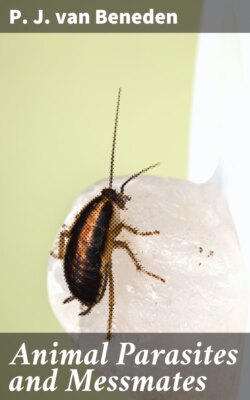Читать книгу Animal Parasites and Messmates - P. J. van Beneden - Страница 5
На сайте Литреса книга снята с продажи.
ANIMAL MESSMATES.
ОглавлениеThe messmate is he who is received at the table of his neighbour to partake with him of the produce of his day’s fishing; it would be necessary to coin a name to designate him who only requires from his neighbour a simple place on board his vessel, and does not ask to partake of his provisions.
The messmate does not live at the expense of his host; all that he desires is a home or his friend’s superfluities. The parasite instals himself either temporarily or definitively in the house of his neighbour; either with his consent or by force, he demands from him his living, and very often his lodging.
But the precise limit at which commensalism begins is not always easily to be ascertained. There are animals which live as messmates with others only at a certain period of their lives, and which provide for their own support at other times; others are only messmates under certain given circumstances, and do not usually merit this appellation.
In the higher animals, this relation between them is generally well known, and justly appreciated, but it is not the same in the inferior ranks; and more than one animal may pass for a messmate or a parasite, for a robber or for a mendicant, according to the circumstances under which he is observed. The sharper passes for an honest man as long as he has not been taken in flagrante delicto. Thus, in order to be just, we must carefully examine the indictment, and not pronounce sentence without strict examination.
The greater part of those animals which have established themselves on each other, and live together on a good understanding and without injury, are wrongly classed as parasites by the generality of naturalists. Now that the mutual relations of many of these are better understood, we know many animals which unite together to render each other mutual assistance; while there are others which live like paupers on the crumbs which fall from the rich man’s table. There are many relations between the different species which can be discovered only after minute examination, but which have recently been appreciated with greater impartiality.
Animal messmates are rather numerous, and commensalism has been observed, not only in animals of the present age, but in those of the primary epoch. Wyville Thomson explained to me, while I was myself his messmate at Edinburgh, at the meeting of the British Association in 1871, that the polyps of the Silurian age already practised it. We do not class among animal messmates those living creatures which, like the birds which we keep in cages, charm the ear with their song, or which, in spite of our care, live at the expense of our pantry; we will only refer to veritable messmates, which, sometimes through weakness of constitution, sometimes for want of activity, can neither feed themselves nor bring up their family without seeking help from their neighbours.
There are some free messmates which never renounce their independence, whatever may be the advantages which their Amphitryon enjoys; they break their alliance with him for the slightest motive of discontent, and go and seek their fortune elsewhere. Their susceptibility or their love of change guides them. They are recognized by their fishing implements or their travelling gear, which they never lay aside. These free messmates are the more numerous. The others, the fixed messmates, instal themselves with a neighbour, and live at their ease, having completely changed their dress, and renounced for ever an independent life. Their fate is thenceforward bound to him who carries them.
Under these two categories we shall cite several examples, and glance at the differences which the various classes of the animal kingdom present in this respect, beginning with the higher ranks.
